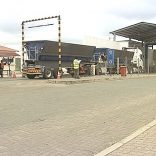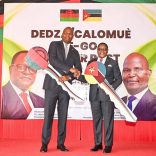World Bank lowers 2025 Mozambique growth forecast to 3%
Mozambique: Filling the $2 bn hole – Hanlon

Pressure is growing on Mozambique to fill the hole created by the secret debt. Although some budget support donors will in future only fund projects, others want to continue budget support. But they will not allow their money to be used to make repayments on the more than $2 billion in secret debt. In order to satisfy those donors, to bring debt levels back to sustainable levels, and to find funding for the government’s share of the Liquefied Natural Gas projects, Mozambique is going to have to find substantially more than $2 bn – without taking on new debt or simply rolling over the old loans. And the current crisis means Mozambique cannot return to the bond market. President Filipe Nyusi’s unexpected visit to China 16-21 May might be intended to raise money, but more loans will not help.
There seem to be three ways to raise this money. First is to recover money siphoned off for corruption as part of the secret loans and bonds. The three loans were all organised by Credit Suisse and the Russian bank VTB. It will be argued that the two banks misled bondholders by not telling them that there were three different loans and that the money was for arms. At the very least, the banks will be under pressure to reveal where the money went, or, alternatively, in secret to organise some return of money in foreign bank accounts. Similarly those members of the Mozambican elite who benefitted might be pressed to quietly return some money.
Second, there has always been hostility from the IMF and World Bank to state companies. In the early part of this decade, with gas money in prospect, Frelimo was able to protect state companies. As the World Bank report cited above makes clear, this is no longer tenable, and government will probably be forced to privatise state companies. Last week Finance Minister Adriano Maleiane suggested that the new state companies like Ematum might be privatised. But state companies with assets like LAM and Electricidade de Mocambique are more likely targets because foreign companies (or domestic business people) might pay for them.
Third is gas – Mozambique’s share of the gas and initial gas revenues. The state company ENH (Empresa Nacional de Hidrocarbonetos) owns part of the two gas fields and will gain a share of the gas produced and of company profits. But it must pay its share of the LNG plants – $1 bn or more. Once it would have expected to go to the bond markets, but this is no longer possible. The two main gas companies, ENI and Anadarko, have indicated that they are prepared to organise the funding – but they would be expected to be repaid out of ENH’s first gas or profits, or out of the government’s first royalties. This would delay any gas profits to Mozambique for several more years. ENH would either mortgage its initial profits, or sell off its first years of gas in advance.
If Mozambique has trouble filling the $2 bn hole, perhaps because parts of the Frelimo elite refuse to return corruptly gained money, Mozambique might be forced to sell more gas in advance. This could also be where China comes in. Might China buy the airports company or make an advance gas purchase?
Whatever happens, this suggests that Mozambican revenue from gas will be deferred for several years. Combined with IMF austerity, it looks like the next five years will be hard.
By: Joseph Hanlon












Leave a Reply
Be the First to Comment!
You must be logged in to post a comment.
You must be logged in to post a comment.